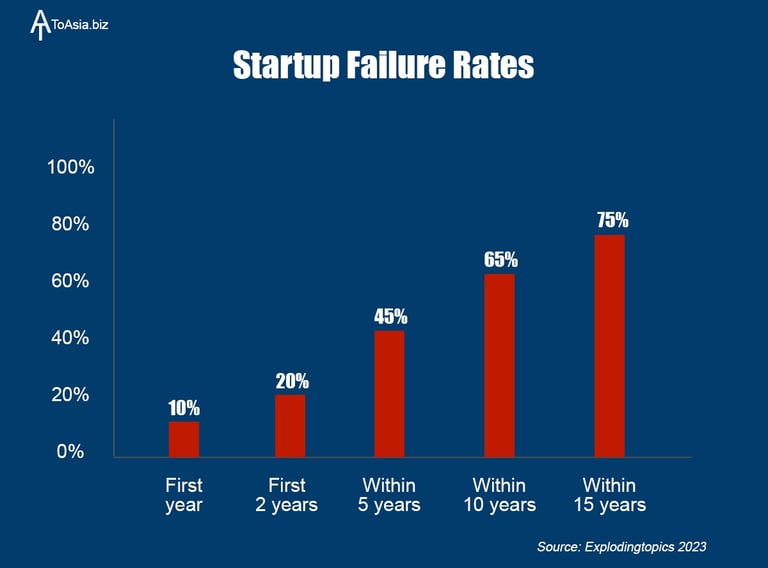The Ten Commandments of Business Failure in Asia
BUSINESS TIPS
Alan Wong
5/23/20236 min read


In the unpredictable world of business, success is often celebrated, while failure is brushed under the rug.
However, acknowledging and learning from failures can be just as valuable as studying success stories.
Understanding the reasons behind business failures is essential for aspiring entrepreneurs and business owners.
In this article, we will explore the ten commandments of business failure, examining key areas where businesses commonly stumble and offering insights to help you avoid these pitfalls in Asia.
Ten Commandments of Business Failure 1: Ignore the startup Failure Rate
The startup failure rate is a sobering statistic that is 90% and 10% of new businesses don't survive the first year of operation.
Ignoring this reality and being overly optimistic can lead to a lack of preparedness and strategic planning.
Conduct thorough market research, analyze industry trends, and develop a robust business plan to navigate the challenges ahead.
Visit our blogs and business insights page to avoid market entry failure.


Ten Commandments of Business Failure 2: Not Adapt to Technology
In today's digital age, failing to adapt to technology, especially artificial intelligence (AI) can be a death sentence for businesses.
Companies that resist technological advancements and fail to embrace digital transformation often find themselves left behind.
Keep a finger on the pulse of technological innovations in your industry and explore how they can enhance your operations, customer experience, and overall competitiveness.
Ten Commandments of Business Failure 3: Overlook the Top Reasons Business Fail
Awareness of the common reasons businesses fail is crucial for avoiding the same fate.
Lack of market demand:
This is often the primary reason businesses struggle.
In Asia like Singapore, a highly competitive market means that understanding and meeting market demand is crucial.
Products or services offered must solve a real problem or fulfill a need for consumers.
Market research, customer feedback, and continuous product or service innovation are vital strategies to stay relevant and in demand.
Not Understanding the Competition:
Underestimating or not adequately researching the competition can lead to strategic missteps.
Asia's business landscape is competitive, with both local and international players.
A comprehensive analysis of competitors' strengths, weaknesses, strategies, and customer base provides insights that can inform better business decisions and strategic positioning.
These are just a few factors that can contribute to business failure.
Conduct a thorough analysis of these reasons and proactively address them in your business strategy.
Ten Commandments of Business Failure 4: Neglect the Power of a Solid Business Plan
A well-crafted business plan or go-to-market plan serves as a roadmap to success in the Asian Market.
Failing to invest time and effort into creating a comprehensive and realistic plan can lead to disastrous consequences.
Your business plan should outline your goals, target market, financial projections, marketing strategies, and contingency plans.
Regularly review and update your plan to adapt to changing market dynamics.
ToAsia.biz develops a practical business plan in the Asia Pacific with a focus on profitability.
Chat with us to grow and de-risk!
Ten Commandments of Business Failure 5: Succumb to CEO Failure
Leadership critically shapes the trajectory and potential success of a business, with the role of a CEO being pivotal in steering a company toward success or leading it to failure.
Effective leadership transcends mere management to encompass navigating challenges, inspiring teams, driving innovation, and making strategic decisions with a blend of vision and adaptability.
Strong leaders cultivate positive and productive organizational success, essential for fostering innovation and adaptability.
In contrast, ineffective leadership is characterized by poor decision-making and a lack of vision can undermine even the most promising ventures.
Hence, cultivating strong leadership skills, surrounding oneself with a talented team, and promoting a culture of continuous improvement and humility are vital.
Embracing mentorship and committing to the ongoing development of leadership abilities are key strategies for ensuring that leaders can guide their businesses successfully through the ever-changing business landscape.
Ten Commandments of Business Failure 6: Ignore Customer Feedback and Relationship
In today's customer-centric era, especially in markets like Hong Kong, Singapore, and Japan, where consumers are well-informed and hold high expectations for quality and service, overlooking customer feedback and needs can swiftly lead to declining sales and diminished loyalty, ultimately risking business failure.
To thrive, businesses must prioritize active listening, conduct surveys, and gather customer feedback to deeply understand and meet their expectations.
Utilizing this vital information allows for the refinement of products or services and the enhancement of the overall customer experience and relationship.
Engaging with customers, soliciting their feedback, and adapting offerings to align with their evolving preferences are essential strategies.
By building strong relationships through excellent service and engagement, and customer relationship management tools, businesses can stand out in crowded markets, ensuring their growth and sustainability by addressing the lifeblood of their enterprise—their customers.
Ten Commandments of Business Failure 7: Not Embrace Change
In the swiftly evolving business landscape, particularly within Asia's tech-savvy market, the rapid pace of technological advancements and shifting consumer behaviors necessitates continuous innovation to avoid obsolescence.
Embracing change and staying nimble is crucial, as businesses must incorporate innovation into the core of their strategy, covering products, services, processes, and even business models.
Keeping abreast of industry trends, consumer preferences, and emerging technologies is essential for businesses to continuously reinvent and innovate their offerings.
This proactive approach ensures they remain relevant and competitive in a market where stagnation equates to decline.
Embracing the adage that doing business is akin to riding uphill—where failing to move forward means falling backward—underscores the importance of progress and adaptation for sustained business success.


Ten Commandments of Business Failure 8: Not Cultivate a Strong Company Culture
A disengaged or toxic company culture can undermine employee morale and hinder productivity.
Neglecting to foster a positive work environment and failing to invest in employee development can lead to high turnover and decreased performance.
Cultivate a strong company culture based on trust, collaboration, and continuous learning.
Invest in your employees' growth and well-being to create a motivated and dedicated team.
Ten Commandments of Business Failure 9: Mismanage Finances
Poor financial management is a prevalent cause of business failure across Asia,
characterized by a myriad of challenges such as inadequate cash flow, excessive debt, improper budgeting, insufficient capital, and a lack of financial controls.
These issues can severely cripple a company, limiting its operational capabilities and growth potential by hampering financial flexibility and
leading to underestimated expenses alongside overestimated revenue.
Neglecting thorough financial analysis and reporting further hinders effective decision-making, while a lack of financial expertise exacerbates these problems.
To counteract financial mismanagement, businesses must prioritize financial literacy,
engage in meticulous planning, establish robust financial systems, and advanced payment systems, conduct regular performance monitoring, and proactively manage cash flow.
Additionally, exploring various financing options, including government grants and
business loans available in Asia are essential to securing the necessary support for sustained growth and success.
Implementing these sound financial practices and seeking professional guidance can help businesses navigate financial pitfalls and achieve sustainable development.
Ten Commandments of Business Failure 10: Underestimate the Power of Marketing and Branding
Effective marketing and branding are essential for business success.
Underestimating the importance of building a strong brand identity and
implementing targeted marketing strategies can limit your reach and hinder customer acquisition.
Invest in market research to understand your target audience and develop compelling messaging and branding that resonates with them.
Utilize various marketing channels, both online and offline, to create awareness and build a loyal customer base.
Understanding the common pitfalls that lead to business failure is crucial for aspiring entrepreneurs and business owners.
By heeding the Ten Commandments of Business Failure, you can increase your chances of building a successful and sustainable business.
Learn from these mistakes, make informed decisions, and continuously iterate your strategies to thrive in the dynamic business landscape.
Remember, failure can be a stepping stone toward success when approached with the right mindset and a willingness to learn.
With over 50 years of experience in Asia Pacific combined at ToAsia.biz, our business growth experts understand the needs of Western Tech CEOs.
Talk to us early to prepare your business to expand to the Asia Pacific region - Profitably.






Alan Wong is founder of ToAsia.biz and a startup mentor with over 20 years of professional experience managing software, Saas and consulting services MNCs.
About Author
Copyright © 2026 ToAsia.biz


We lead your business to Asia
Our Business Growth Experts help SaaS businesses achieve growth in Asia and become profitable FAST.
Send us a message via WhatsApp
